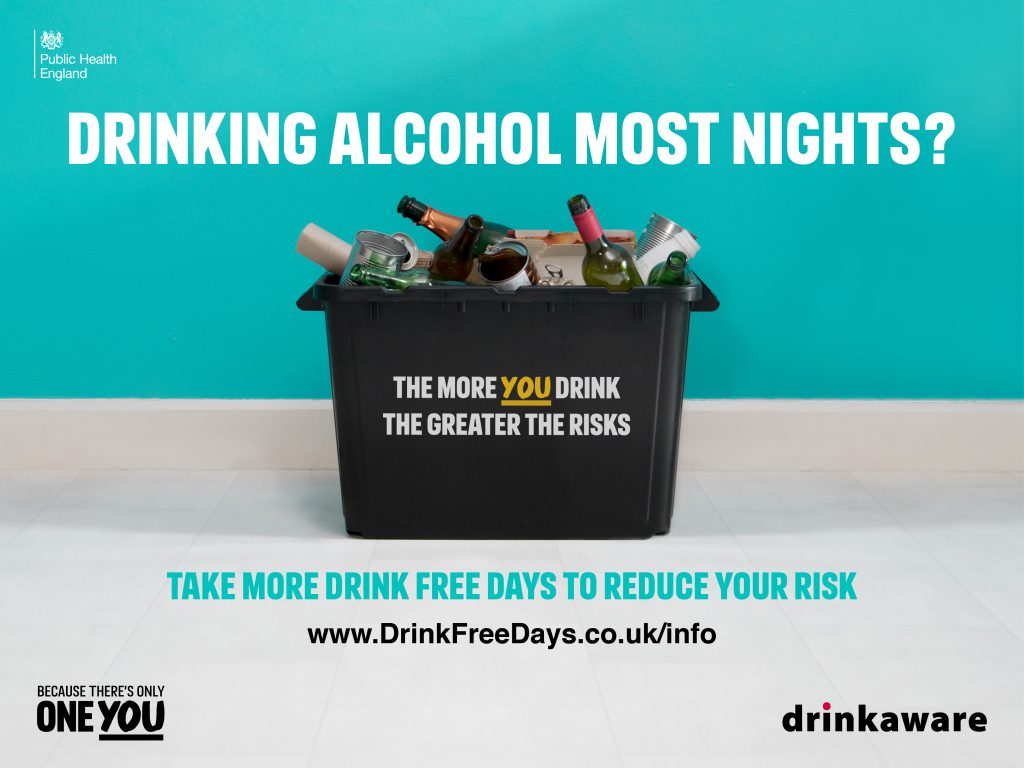
Today we have announced something different. For our new alcohol campaign, we are partnering with the educational charity Drinkaware to encourage middle-aged regular drinkers to take more drink free days to help reduce their risk of developing serious health problems.
The campaign, Drink Free Days, branded as part of PHE’s OneYou, will use radio ads and social media to engage drinkers with messages that will resonate with many such as:
‘Have you ever told a little white lie when your doctor asks how much you drink? It’s easy to kid ourselves about our drinking.’
This new partnership with Drinkaware is the first step in reframing our relationship with the alcohol industry, and with those who work with them, around harm reduction.
Some people will disagree with PHE working with Drinkaware as they are partly funded by the alcohol industry but factually they are governed independently and we will be fiercely vigilant on this.
We already have a strong track record of working with industry partners to encourage healthier lifestyles at a population level. For example, our work on Change4Life, which involves around 200 national partners, is helping to build new social norms and supports PHE’s reformulation agenda by creating consumer demand amongst parents and children for healthier foods.
You will have seen the early successes we have had with the food industry to reduce sugar in their products and this is the approach we are going to take with the alcohol industry.
PHE’s campaigns have a strong track record in encouraging behaviour change and supporting people to take action using digital tools. Each year there are over 9 million visits to the Drinkaware website. By working with them we can leverage this extensive reach to the key audiences.
We will undertake our own evaluation of the campaign, independent of Drinkaware and funded by PHE.
The bottom line is we need to get real with the public on harm reduction.
While many people drink at lower risk levels, 10.8 million adults in England are drinking at levels that pose some risk to their health (1 in 5 women and 1 in 3 men).
Most people are unaware that they are drinking over the lower risk limits and most are unconcerned about their use of alcohol. The odd drink after work, a few beers on the sofa watching the football or half a bottle of wine with dinner a few nights in the week, on top of the more traditional social drinking over the weekend, creeps up on you.
The overwhelming majority of these people do not have a serious problem with alcohol and are not dependent, they are just drinking a bit too much and too often.
The campaign launches as a new YouGov poll of 9,000 UK adults finds that one in five of UK adults are drinking above the Chief Medical Officers’ low risk drinking guidelines and more than two thirds of these say they would find cutting down on their drinking harder to do than one or more other lifestyle changes - improving their diet, exercising more, or reducing their smoking, if they were smokers.
And while many are aware of the link between alcohol and liver disease, there is far less awareness of the links to a range of cancers, heart disease, high blood pressure and over 200 other health problems where alcohol is a causal or contributory factor.
Alcohol misuse accounts for £3.5 billion in costs to the NHS but this figure is dwarfed by the costs to the wider society which includes £11 billion on alcohol-related crime and £7 billion in lost productivity through unemployment and sickness.
The message to reduce your risk by drinking less by having more regular drink free days every week is part of our One You healthier behaviours campaign, that we know is an easy to achieve and palatable message to people who enjoy a drink and works for them without being condescending.
More widely, by engaging in this way, we have the opportunity to extend the choice of no and low alcohol products, reframe how we speak with the public about the risks of alcohol, and ultimately reduce alcohol harms.

3 comments
Comment by Richard Johnson posted on
The association with Drinkaware and PHE is wrong in my opinion. PHE must remain independent from industry and remain a public body. I have just listened to Radio 4 interview with John Newton and he was totally unconvincing.
Several years ago I lived in Australia and remember a food book published by the CSIRO (a Government body) in association with the Australian meat industry called Total Wellbeing Diet and it was almost entirely filled with meat recipes. I never ever trusted CSIRO after buying that book.
Even by this announcement PHE is diminished and its advice can no longer be trusted to be independent.
Comment by JohnC posted on
Drinkaware funders have duped Drinkaware and you by positioning it as 'the' voice on alcohol, but keeping it's activity 100% downstream. Nothing about preventing drinking patterns getting started at all.
You talk about prevention as a general concept, talk all around it, but do nothing on it.
Comment by Steve posted on
Drinkaware is funded by the alcohol industry and several of it's current staff are linked to Diageo, Tesco and others that are profiting hugely from our national drink problem. PHE is deeply misguided in linking itself to this body. Duncan Selbie should consider his position.